1.Three Horseman of Bull Market All Made New Highs. Buybacks, IPOs and Spin-Offs.
PKW Buybacks after lagging when rates blipped higher, now rally mode.
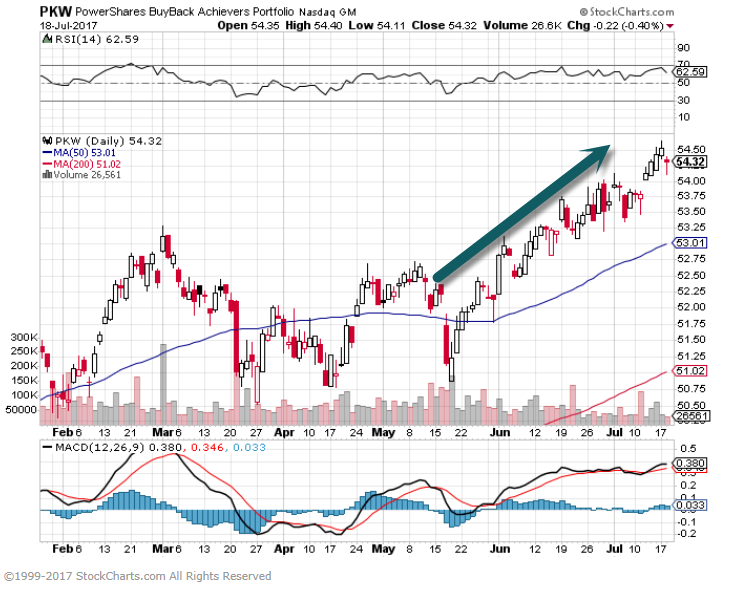 IPOs Outperforming Market in 2017
IPOs Outperforming Market in 2017
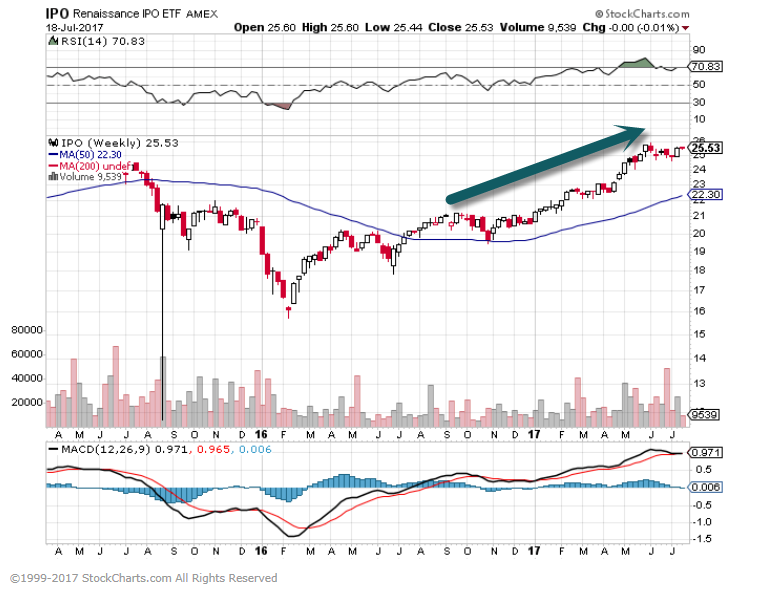 Spin-Offs New Highs.
Spin-Offs New Highs.
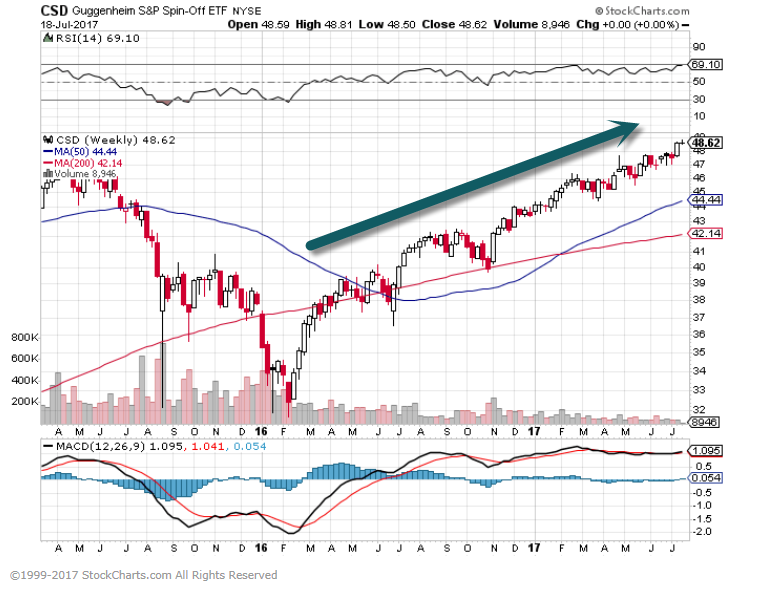
2.Transports did Make New Highs.
I had pointed out that Transports were not making new highs with market but that has changed in July.
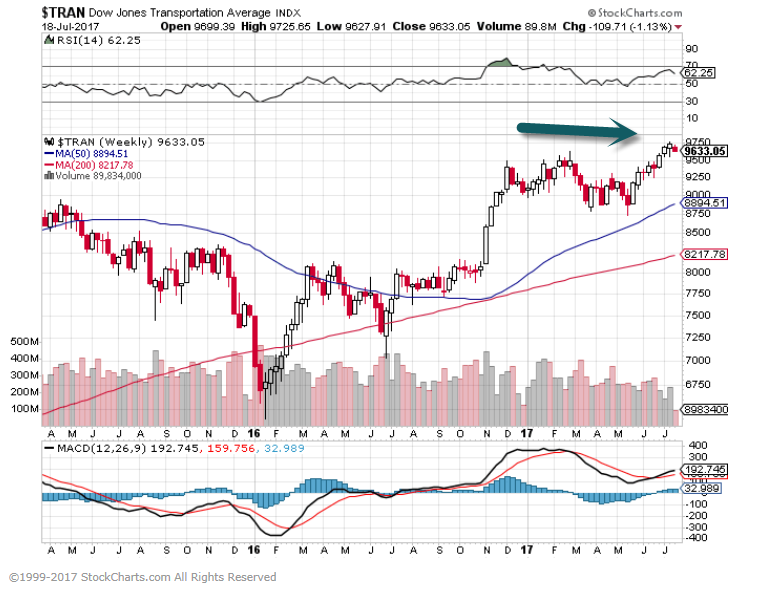
3.The World Now has Over 1000 Smart Beta ETFs
Factor Returns Since 2006 from Dorsey Wright.
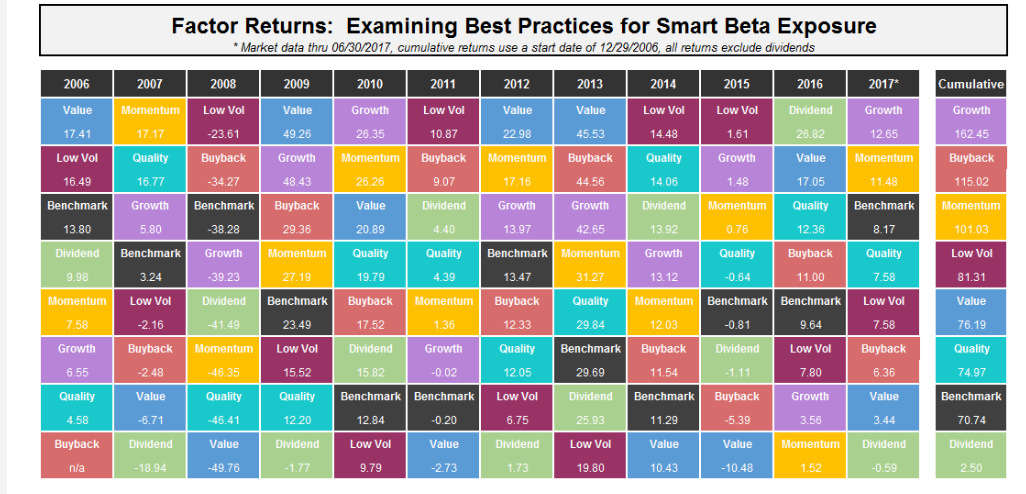
Chart courtesy of Dorsey Wright
www.dorseywright.com
4. Zero To 3,000 Listed Companies In China In 24 Years
By Dr. Andrew Stotz, CFA
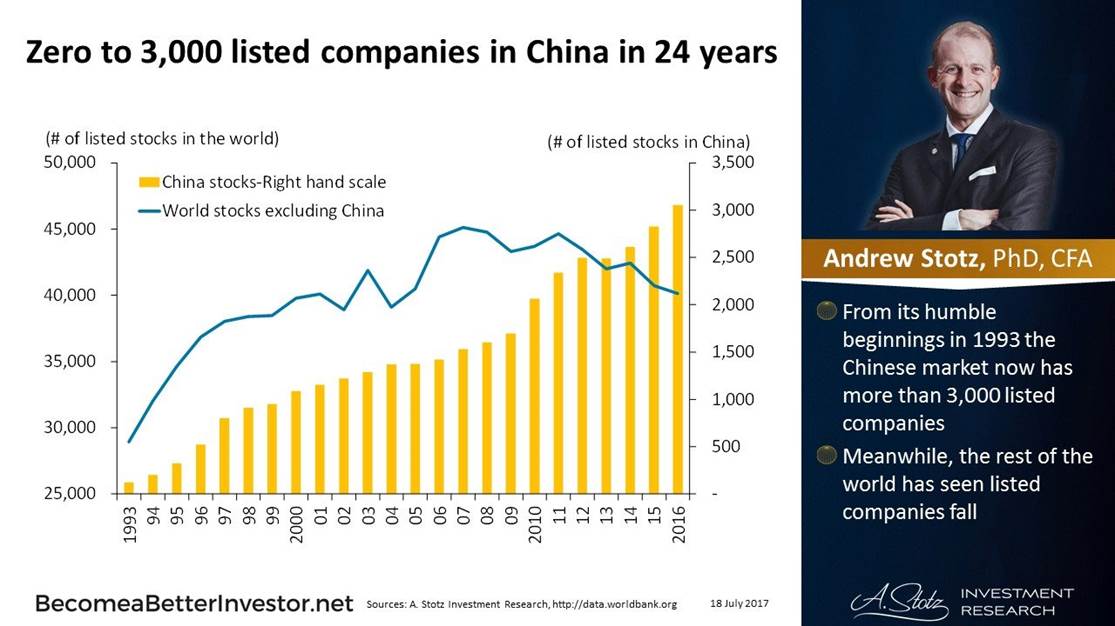
http://www.valuewalk.com/2017/07/zero-3000-listed-companies-china-24-years/
5. What Bond Traders Are Most Worried About Right Now

6. Goldman Sachs Struggles to Navigate the Markets
Breakingviews
By JOHN FOLEY JULY 18, 2017
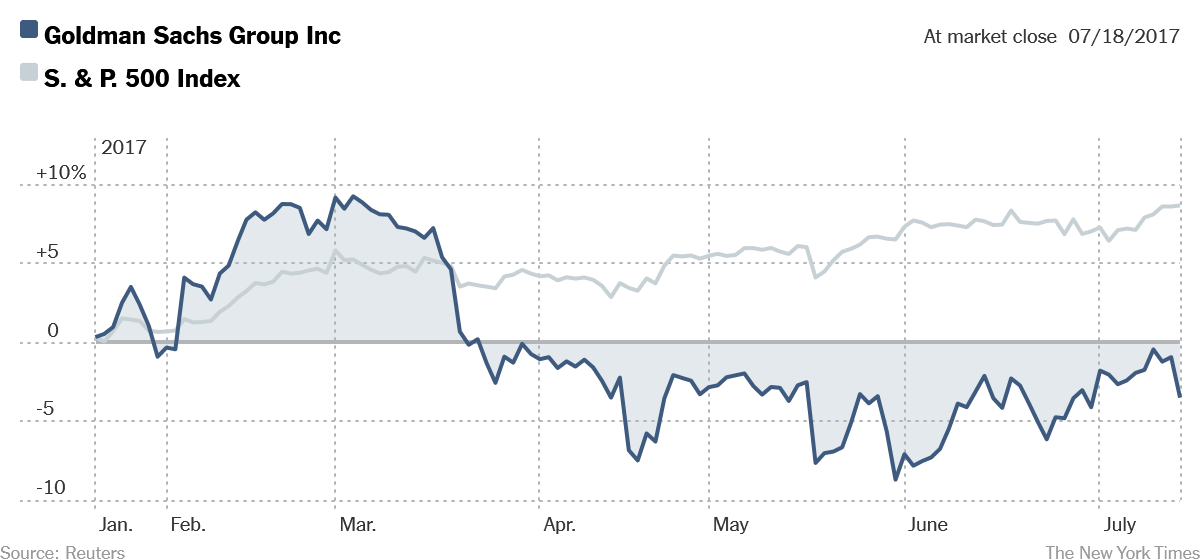
Who cares about a few bad weeks in fixed-income markets?
Jamie Dimon, JPMorgan Chase’s chief executive, raised that reasonable question last week. The answer is Lloyd C. Blankfein at the rival Wall Street firm Goldman Sachs, which on Tuesday reported a 40 percent year-on-year slump in revenue from trading bonds, currencies and commodities. Goldman’s market compass is a little off, and investors may soon expect Mr. Blankfein to fix it more quickly.
The quarter to June was the second in a row in which Goldman, the $90 billion financial company, has been out-traded by its peers. While others warned that the period would not be as good as a year earlier — basically because fewer freaky things happened in the market — JPMorgan and Citigroup reported revenue shrinkage in their equivalent divisions less than half as severe as Goldman’s.
7.These are the countries suffering the most from low oil
prices
Jeff Desjardins, Visual Capitalist
As Warren Buffet says, “Only when the tide goes out do you discover who’s been swimming naked.”
And in 2014, when oil prices crashed and burned, the tide was gone – and it was shown that too many countries were relying on frothy oil revenues to balance out their trade deficits.
A LINGERING CRISIS
Fast forward to today, and low oil prices are still causing big problems for many countries. The above interactive visualization from the Council of Foreign Relations shows how the world economies most reliant on oil exports have fared since the 2014 crash.
The end results are not pretty – and even in 2016, there were 18 economies that had breakeven prices (based on spending on imports) that were above the average oil price for the year:
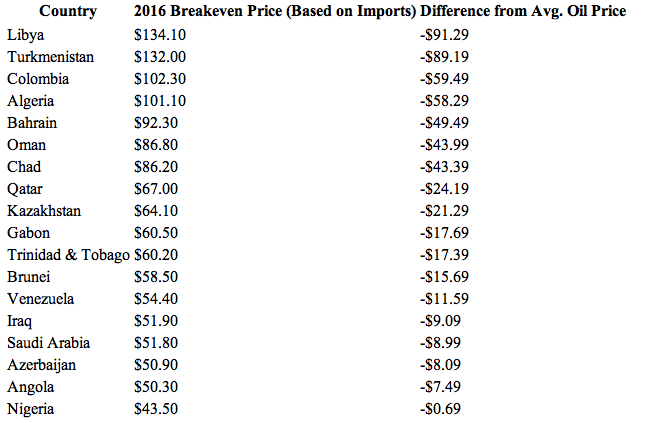
The oil price crash made many oil-reliant economies more fragile, and this fragility can be triggered in different ways. One interesting case study is Venezuela, which is currently embroiled in an ongoing economic, currency, and humanitarian crisis.
Here’s the full fiscal breakeven needed by OPEC producers, including Venezuela, to help normalize things:
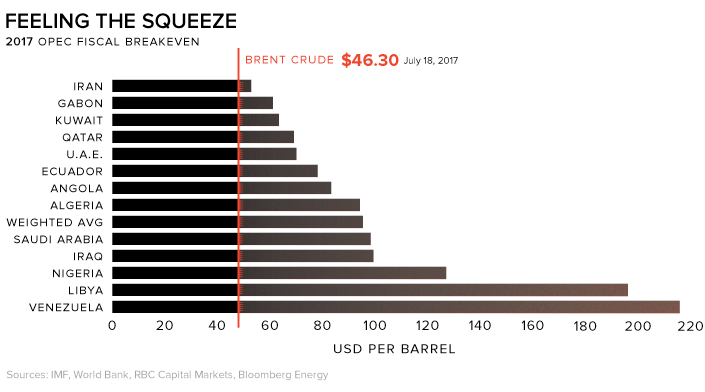
Courtesy of Visual Capitalist
http://www.businessinsider.com/these-are-the-countries-affected-most-by-low-oil-prices-2017-7
8.Looks Like International Buyers Still Want to Park Money in USA
Foreigners snap up record number of US homes
Foreign buyers closed on $153 billion worth of U.S. residential properties for the 12 months ended in March.
That marks a 49 percent jump from 2015-2016, according to the National Association of Realtors.
· Florida, Texas and California drew the most international buyers.
· Foreign sales accounted for 10 percent of all existing home sales by dollar volume and 5 percent by number of properties. In total, foreign buyers purchased 284,455 homes, up 32 percent from the previous year.
· Half of all foreign sales were in just three states: Florida, California and Texas.
http://www.cnbc.com/2017/07/18/foreigners-snap-up-record-number-of-us-homes.html

9.Read of the Day….Risk is About You
Against the Gods
How to Think About Risk in Your Personal Finances
This week I want to discuss a book I read recently called Against the Gods: The Remarkable Story of Risk by Peter L. Bernstein. Besides Bernstein’s incredible writing style and memorable anecdotes, the book fundamentally changed how I viewed risk with regards to my personal finances. My goal with this post is to highlight the main idea of Bernstein’s book and provide a simplified framework for thinking about risk and your money. To start, let’s take a very brief tour on the history of risk in human society.
Until the mid 1650s, human societies viewed uncertainty and risk with something destined from on high. For example, during a recent visit to the ancient Mayan city of Tulum I was told that the Mayans worshipped many different Gods, each of whom controlled a particular aspect of the universe. If a Mayan farmer needed rain, they would provide an offering to a rain God. If they needed to go to war, they would go to their war deity, and so forth. Chance was outside of the realm of humans and left up to the Gods.
This idea was not unique to the Mayans. Almost universally human societies have, at some point, believed in a God (or Gods) to ask for help or guidance. It was only within the last few hundred years that this relationship changed and humans decided to go against the Gods and learn the rules of chance. Alas, the title of Bernstein’s book and this post. While humans have made a lot of progress since ancient times, we are still not great at thinking about risk, especially in terms of personal finances. So, let’s address and simplify risk.
One definition of risk is the chance of losing money. This is a useful definition, but it misses two important components: time and your expected future liabilities. We will need to address these before we can come to a fuller understanding of risk.
Full Read
https://ofdollarsanddata.com/against-the-gods-3729ed3bb192?curator=thereformedbroker
10. Life Lessons from My Dad
. By Craig Ballantyne
Have you met someone, or known someone close to you, that ‘woulda been, coulda been, shoulda been’ great?
I do.
It’s painful to say this, but it’s my father. Born on July 20th, 1939, he passed away on September 9th, 2008, only 69 years old.
He was smart, funny, and hard working. But those talents were, in my opinion, squandered. For whatever reason, my dad’s envy, bitterness, and alcoholism stopped him from being a great man.
I loved him. I wish every day he was still around. As much as he embarrassed me with his drinking, he was still a good dad. But I know he could have been great. He taught me a lot, but not in the traditional sense. I learned most of his lessons through observation, more often what NOT to do if you wanted to live a good life.
So as we approach what would have been his 78th birthday, my dad’s going to share with us 10 life lessons for success. I wish he was here to teach them, but we’ll have to learn through his stories instead.
Today you’ll discover how to live life on your own terms from the success rituals and many failures of my father. You’ll learn why you must not suffer in silence, and why you must communicate, ask for help, and treat others well. When you learn what NOT to do from my dad, you’ll have powerful routines and habits in place for a life well lived.
Here are 10 life lessons from an unconventional man, Howard Ballantyne. If you would prefer to listen to the 10 lessons you can access my podcast here.
1) Work Hard, Work Early, Work Wisely
When you’re a farmer’s son, you learn what a good day of honest work looks like.
Cattle don’t take holidays from eating… or pooping. That meant dad was up early every morning, hungover or not, feeding the cattle before feeding himself. Every day. Rain, shine, sleet, or snow.
Not only did he have to feed the animals, he had to grow the feed. A farmer’s life is a perpetual cycle of plant, grow, harvest, and feed. It’s like a treadmill you can’t get off, but one that is simultaneously rewarding and peaceful.
My father was not just a farmer, but a welder, electrician, plumber, and mechanic. He could fix engines, build machinery, and keep the house running. He was also part veterinarian. He delivered calves, tended to sick animals, and spent plenty of time chasing them, too, especially when it came time to send them off to the butcher.
His hands looked like they had lived three lifetimes and represented his protestant work ethic. There were parts of fingers missing from being caught in machinery (which was common in our community). In the summer his hands and forearms were tanned a dark brown from days spent in the sun, while in the winter his fingers were cracked from working in the bitter cold.
This life lesson of always working, and working hard, sunk in at an early age, although I took a little detour. My father worked manual labor all day, every day. But much to his – and my mother’s – dismay, I worked all day every day to avoid manual labor. Today it doesn’t bother me to start work before sunrise and go until past sunset. That’s not something I should be doing, but I’m not scared of it… and it’s all because I watched my father do the same thing for many years.
Our friend Bedros Keuilian learned a great line from his Armenian father, “Work is holy.” My father certainly wasn’t a holy man in the traditional sense, but when it came work, he was as righteous as a man could be.
2) Be a Consistent & Present Parent
Father of the year, my dad was not. That said, in some ways, he was a better parent than many dads are today.
He loved to attend my hockey games. He tied my skates for years when I was young. And he caused me enormous embarrassment in my teenage years when he’d show up at the rink for my games in a drunken stupor.
But he didn’t go to a single one of the hundreds of soccer games I played as a kid. I didn’t care. All I wanted from my parents was a ride to the game. I was there to see my friends, not perform for mom and dad.
That’s why I don’t understand helicopter parents, the ones who suffer from great guilt and shame if they can’t make every single piano practice or football game. Your kids probably don’t care. Let them go and have some fun. All that matters is that you drop them off and pick them up on time. Consistency is king.
Of course, when kids are really young, they want to spend time with you. And they want you, the parent, to be focused on spending time with them, not checking your phone.
“Wherever you are, be there,” said the great Jim Rohn.
My dad never had a cell phone. He never used the Internet. I don’t even think he ever touched a computer. But even if he did have a phone, I can’t imagine him checking when we would play catch in the backyard.
He was present. Every day in the summer, right after lunch, we’d play catch. He’d teach me how to throw a curve ball. Sometimes he’d pitch to me, and when he’d hit me with a fastball, he’d say, “That’ll toughen you up.” We’d play until we lost all of the balls in the garden, not until he was distracted by a cellphone. Jim Rohn would have approved of his presence, although perhaps not his attitude about fastballs.
3) Live Life On Your Terms
My father didn’t care much for other people’s opinions. He was as comfortable in his own skin as anyone could be. Comb his hair? Dress up? Follow convention? Not unless he was forced to by mother when attending a wedding or big event.
There was only one rule in my father’s mind. And that was, there are no rules. Not many people have courage to throw caution to the wind, but he did, and I admire him for it. It’s not easy to take the road less traveled, but when that road is chosen wisely, you’ll often be better for it.
4) Overcome Mental Obstacles
While he didn’t care for convention and what other people thought about him, he struggled with his opinions of other people. For some reason he destroyed many of his relationships; Friends today would be gone tomorrow.
I remember my father cycling through drinking buddies on a three-month schedule. One day I’d get home from school and there’d be a new truck or van in the driveway. Dad would be in his shop with some stranger, and they’d be sitting around with beers. This would go on for months until one day, suddenly, that drinking buddy would disappear from dad’s life.
As I grew older and noticed this happening time after time, I finally realized that my dad was destroying relationships. He had bitterness and jealousy towards his old friends, criticizing them behind their backs, or making fun of them in their presence. These internal demons destroyed his relationships and eventually destroyed him too.
5) Ask for Help
My father was born in a generation where a man didn’t show weakness or ask for help. What a shame. If he had only… But we can’t play the “What If” game. He didn’t. And he paid the price.
Fortunately, today is different. It’s still not easy to ask for help, but it’s easier to admit when you’re down. It’s okay to be vulnerable. In fact, I’ve found the more vulnerable you are the less you hurt. It’s a paradox.
If only my dad had been strong enough to say to my mom, or anyone, that he needed help with his drinking, and whatever it was that drove him to drink. If only he had gone to the doctor every couple of years. If only he spoken up about the fears, anxiety, and worries in his head.
From asking around it sounds like my dad’s side of the family long had a history of mental health struggles. My dad’s dad died in suspicious circumstances that sounded a lot like suicide. And my dad held that in forever, and that fear and anxiety festered like a psychological cancer. It ate him up inside because he never let it out.
Maybe that’s why I talk so much about this, and my anxiety, and why I’m willing to look high-and-low to continually evolve. It’s because I’ve seen what can happen to you stay still.
Suffering in silence will get you. It gets everyone. It’ll bring you to your knees no matter how strong you think you are. I’ve never seen anyone come out of it better.
Take it from my father (even though he didn’t teach it directly), and ask for help. Otherwise you’ll pay a severe price.
6) Treat People Right
My dad never understood how hurtful words could be. I picked up this trait and it nearly destroyed my relationships. Fortunately I had friends like Bedros Keuilian, Joel Marion, and Matt Smith who were strong enough to make me aware of my problem, and who were kind enough to support me as I worked to overcome it. But my dad never did… or he just never listened when wisdom came his way.
If only he had heard this quote from author Maya Angelou who said:
“I’ve learned that people will forget what you said, people will forget what you did, but people will never forget how you made them feel.”
As cliché as it sounds, this quote truly changed my life. I learned long ago that you can be smart and give good advice to people, but if you’re a jerk when you do it, then all they remember is that you’re a jerk, and the good advice goes out the window.
People will give you a second chance, but as my father found out the hard way – and as I did too – they aren’t going to take a bad attitude forever. Eventually you run out of people.
When I saw that happen to my father, I vowed to never let myself be like him. I opened my heart and mind just enough so that I was able to get help and fix this area of weakness.
7) NOT to do List
Ah yes, what NOT to do. This is where my father excelled in instruction.
Some days I can’t believe he lived as long as he did. He drove like a maniac, often drunk. He climbed 80-foot silos, dangling one arm and leg off the rungs as he reached the top. He raced snowmobiles at 70 miles an hour without a helmet. One drunken afternoon while cutting wood, he hit himself in the face with a chainsaw. He was lucky to escape with just a scar down his nose and under his eye.
To my father, a “Keep Out” sign meant, “Come on in! All the good stuff is back here.” Perhaps his recklessness is a reason for my conservatism.
He lived on a diet of beer, coffee, sandwiches, and candy. Each night he’d eat two chocolate bars and half a bag of cherry licorice. Yet he never had more than 160 pounds on his 5 foot 10 frame. He didn’t have many teeth though, either.
Dad didn’t visit a dentist or doctor for over 30 years. Eventually it caught up to him. In 2007, my mother dragged him to the hospital. The doctors said he was minutes from death. It was there that they discovered his body was full of cancer. He’d lived unknowingly with colon cancer for nearly a decade, our family doctor estimated. By then the cancer had spread to his liver.
He spent the next 18 months growing weaker. It hurt to see the man I once saw as a superhero slowly turning into skin and bones. The bright side is that my mom bought him an extra year-and-a-half of life that day.
It’s one of the greatest gifts she’s ever given me, but one that could have been avoided if dad had only done the right thing and gone to the doctor regularly.
8) Communicate, Don’t Isolate
Over those 18 months my dad and I spent a lot of time together. We’d drive down dirt roads checking out the corn in other farmer’s fields. I’d take him to check out used tractors, and we’d drive hours to various hospitals for his tests and treatments.
We didn’t talk much during that time. When we did, it was superficial. When I wasn’t with him at home, he’d call me at my home in Toronto every day at 4:30 p.m. to ask about the weather. We’d then stumble awkwardly through small talk until he’d abruptly say, “Alright, I’ll let you go.”
We were both too stubborn and uncomfortable to probe deeper, to ask serious questions, or breach topics of significance. I’m not sure if either of us would have been open to it anyway.
His consistency in life was reassuring, but his isolation in his communication was his downfall. He needed to talk. He had demons in his mind and obstacles in his way that held him back, that left him emotionally immature, and stunted his relationships. I wish he could have broken through, but I was not wise or strong enough to help him.
The big lesson is that communication beats isolation when there is something bothering you. It’s a lesson I’ve had to learn the hard way, through experience and failure, over the last ten years because my father was unable to teach it to me.
Whatever it was that led him to alcohol and recklessness, it might have been resolved, and certainly helped, had he just been able to drop his guard and open up.
Don’t make the same mistake. Communicate, don’t isolate.
I nearly made the same mistake, but when I finally opened up, set aside my ego, and spoke from the heart, it started a personal transformation that has made all the difference in my life.
9) Keep the Child Within You Alive
My dad never spoke of dying. It’s like he didn’t believe he ever would. Or perhaps he was too scared to confront it.
He never was much of an adult. He avoided adult conversations. He didn’t take life seriously. He liked being a simple farmer. He didn’t make a lot of money, but he was free. He didn’t have a boss. Then again, I don’t think he could have had a boss. No company would have tolerated my father, and my father wouldn’t have tolerated any company.
He was a wild kid at heart that just never grew up. In some areas of life, that’s inappropriate. He neglected certain important responsibilities. However, had he lived well and communicated better, he’d have won the game of life and been at peace.
10) Rituals
Rituals made my father effective, but rituals also brought him to his knees. On one hand, he knew the value of rising early and working hard every day. He understood the literal concept of reaping what you sow. Had he only understand the figurative concept, his personal relationships would not have been such a mess.
His poorly chosen rituals, those of suffering in silence, avoiding communication, and drinking to excess each afternoon, robbed a talented man of a life well lived.
Even in error there are things to admire and remember. Rituals are consistent actions. Consistency is what we crave. We want to know that dad’s coming home at a certain time. We want to know that, if we needed him, he’s around. That’s why, even though my father failed in so many areas, he was still a good dad after all.
My favorite of my father’s rituals was his lazy summer afternoon routine. Each day around three o’clock, he’d get the paper, put a lawn chair under our old willow tree in the backyard, and sit there in the shade with his shirt unbuttoned and a beer beside him. I can still see him now, the breeze rattling the paper, and him in his happy spot.
When my father passed in 2008, I wrote a poem about this ritual and that lawn chair that he’d sit in on hot summer days. You’ll find it a fitting conclusion to his 10 life lessons